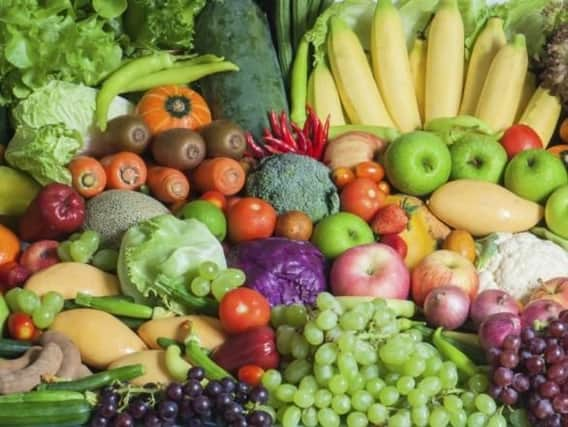Simple steps for a healthier you


Whilst it’s true that we get about half the calories we consume from carbohydrates – this doesn’t always mean that cutting out carbohydrates will deliver the weight loss required.
And it certainly isn’t the way to achieve a balanced diet.
Carbohydrates are just one of the three type of nutrients that make up our diets, alongside protein and fat.
Advertisement
Hide AdAdvertisement
Hide AdA balanced diet should have the correct amount of each type of nutrient.
So what exactly are carbohydrates?
There are three main categories of carbs: sugars, starches, and fibre. Our bodies break down most carbs and transform them into glucose to give us energy.
But all carbohydrates are not the same – there are good carbs and bad carbs.
There are ‘whole’ carbs and ‘refined’ carbs. Whole carbs are unprocessed and are largely as nature intended; refined carbs, on the other hand, are contained in processed foods.
Advertisement
Hide AdAdvertisement
Hide AdVegetables, potatoes, fruit, and whole grains all contain whole carbs and are generally thought to form the foundation of a healthy diet.
Examples of refined carbs include sugar-sweetened drinks, fruit juices, pastries, pies, pasta, white flour, white bread, white rice, and many breakfast cereals. In general, refined carbs represent calories with all the nutrients processed out. Generally, they are foods that don’t exist in nature. Many also come with a sting in the tail.
They have ‘added sugar’ which makes refined carbs even more unhealthy.
A diet based on refined carbs drastically increases risk of many diseases, including obesity, heart disease and Type 2 diabetes. The reverse also applies. A diet based on whole carbs, particularly when eaten in controlled quantities, not only represents a healthy diet – but one on which most people are likely to lose weight.
Advertisement
Hide AdAdvertisement
Hide AdEveryone needs some carbohydrate every day. The actual amount that you need to eat will depend on your age, activity levels and the goals you – and your family – are trying to achieve, for example trying to lose weight, improve blood glucose levels or improve sports performance. The total amount of carbohydrate eaten will have the biggest effect on your glucose levels.
But it would be wrong to blame all carbs for the fact that obesity seems to be becoming a common problem nowadays. The root cause of widespread obesity are refined carbs and processed foods.
So, what are good carbs and how can we add them to our daily diets?
To create a ‘good’ carb, ‘bad’ carb list of foods, it is necessary to generalise – so the following list is for guidance. And it won’t surprise you that the list of ‘bad’ carbs is longer than the list of ‘good’ carbs.
GOOD CARBS
Vegetables
Fruit
Nuts
Whole grains
Potatoes
BAD CARBS
Fizzy drinks
White bread
Pastries, pies, cakes
Ice cream
Sweets and chocolate
Chips and crisps
SIMPLE GUIDELINES FOR A HEALTHY, BALANCED DIET
Advertisement
Hide AdAdvertisement
Hide AdEat Lots of Fresh Vegetables & Fruit – All fresh vegetables, in particular greens, are full of fibre. Eat them raw when you can. Overcooking causes vegetables to lose their nutrients. Don’t cover them with too much dressing, cheese, or other sauces.
Avoid Fast Food – Most Fast food is unhealthy food - it’s that simple. Don’t eat food that you order from your car window.
Avoid Junk Food – Don’t eat food containing lots of sugar, hydrogenated oils, preservatives, artificial flavours or processed flour. Highly processed junk food is very unhealthy.
Read labels – If the product you are buying contains ingredients you can’t pronounce or has more than five ingredients - don’t buy it. Look at the fat, sugar and sodium content as well as the number of preservatives and artificial flavours.
Advertisement
Hide AdAdvertisement
Hide AdCut Down On Sugar - If sugar is one of the top three ingredients of a product - don’t buy it. Cutting down on your sugar is one of the most important things you can do for your health.
Eat Healthy Proteins & Fats – Lean and natural proteins are the best as they digest easily. Red meat can be beneficial, grass-fed and organic beef are best the options, if budget allows. Salmon and most fish are also good for you. Nuts are good snacking proteins. Use cold pressed and organic oils for cooking and flavouring.
Eat Natural & Organic Products – If you eat all natural foods you are going to be healthy. Buy and eat as many natural foods fresh and raw as you can.
Do Allow For Treats & Cheat Meals – Once or twice a week, have a little bit of what you fancy – but try to make it as healthy as possible. Remember you can still reward yourself with quality food.